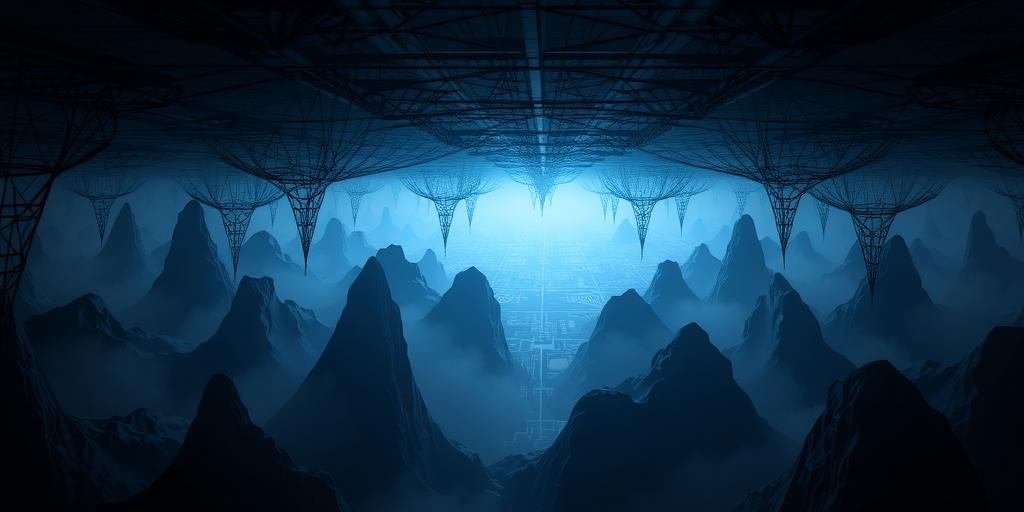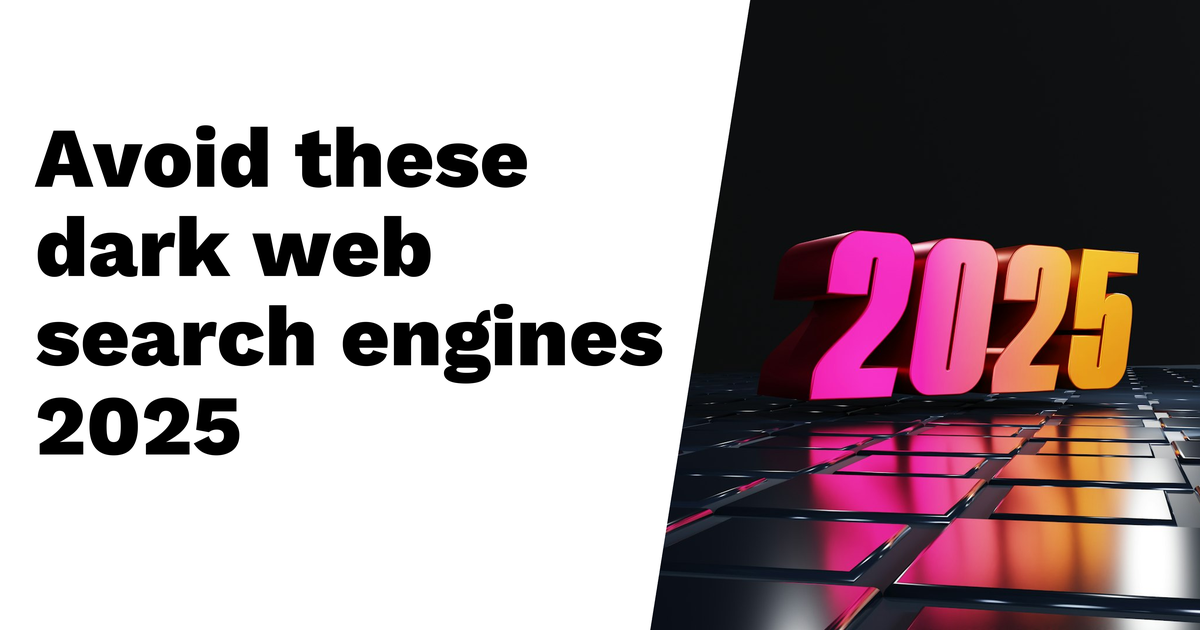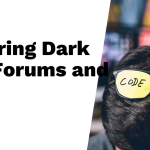When navigating the dark web in 2025, users should be cautious of several search engines known for exposing users to risks. Dark web search engines index .onion sites, unlike standard search engines; they lead to hidden content often connected with illegal activities like cybercrime or drug trafficking. For instance, Torch is an old engine that lacks any censorship and can inundate users with spam and harmful links. Likewise, Haystak provides unfiltered access without enough safety nets in place. Although some platforms like Ahmia attempt to filter illegal content, they still present significant danger. Users must exercise vigilance and consider security tools before venturing into this shadowy digital realm.
Understanding Dark Web Search Engines

Dark web search engines are specialized tools that index .onion websites found on the Tor network. Unlike mainstream search engines such as Google, these engines focus on content that remains hidden from the general public, often diving into areas that are not indexed elsewhere. Accessing these search engines requires a Tor browser for safety, which helps maintain user anonymity. However, the dark web is frequently linked with illegal activities, like drug trafficking and cybercrime, which raises significant risks for users. Navigating these platforms can lead to exposure to harmful content, including malware and scams. Moreover, many dark web search engines lack content filtering, meaning users may stumble upon dangerous sites without warning. While privacy is a key selling point, it’s crucial to acknowledge the potential dangers like identity theft and data breaches. Users must stay vigilant, ensuring they are informed about the risks associated with each search engine they consider using.
Top 10 Dark Web Search Engines to Avoid in 2025
-
Torch Search Engine: This is one of the oldest dark web search engines, known for being completely uncensored. While it provides a vast array of links, it often leads users to spam and harmful sites, making it a risky choice.
-
Haystak: Although it offers a premium version with privacy tools, Haystak indexes .onion links without filtering content by default. This means users can easily stumble upon dangerous and illegal sites.
-
TorDex: This search engine allows users to propose new .onion websites, but it does not vet submissions. This can result in dangerous links appearing in search results, posing significant risks to users.
-
Excavator Search Engine: While it provides thorough indexing of dark web content, Excavator is lesser-known. This obscurity can expose users to unfiltered content, increasing the chances of encountering harmful sites.
-
Ahmia: Although it aims to filter illegal content, Ahmia still provides an uncensored search experience. This combination can be risky, as users may access a broad range of sensitive information without adequate protection.
-
Onion Links: Rather than functioning as a traditional search engine, Onion Links serves as a categorized directory of .onion websites. Users must verify the safety of links themselves, which can be a cumbersome process.
-
OnionLand Search: This engine accesses both deep web and dark web content. While it offers a variety of hidden services, it carries the same risks as other dark search engines, which could lead to harmful encounters.
-
Candle: As a search engine specifically for dark web information, Candle requires users to exercise caution. The potential for security risks is high, and users should be wary of the links they click.
-
Not Evil: Known for extensive .onion content, Not Evil is still associated with numerous risks. Users must navigate the site carefully, being aware of the dangers that lurk within.
-
WormWeb: Designed to simplify access to .onion websites, WormWeb is user-friendly but still carries the inherent dangers of the dark web. Users should remain vigilant when exploring this search engine.
| Search Engine | Risks & Features |
|---|---|
| Torch Search Engine | Oldest dark web search engine; completely uncensored; leads to spam and harmful sites. |
| Haystak | Unfiltered indexing; offers premium privacy tools; lacks default content filtering. |
| TorDex | Users propose new .onion websites; does not vet submissions; dangerous links in search results. |
| Excavator Search Engine | Lesser-known; detailed indexing; potential exposure to unfiltered content. |
| Ahmia | Filters illegal content; still uncensored; users should remain cautious. |
| Onion Links | Categorized directory; users must verify link safety. |
| OnionLand Search | Accesses deep and dark web; presents same risks as others. |
| Candle | Search engine for dark web info; users should exercise caution. |
| Not Evil | Extensive .onion content; associated risks; requires careful usage. |
| WormWeb | User-friendly design; simplifies dark web access; exposes users to threats. |
9. Not Evil
Not Evil is a dark web search engine that presents a vast array of .onion links, some of which lead to safe sites while others can be quite dangerous. Users frequently report encountering spam and harmful content, making it a risky platform for exploration. Despite its seemingly reassuring name, there is no guarantee of security or safety when using this search engine. The lack of effective content filtering means that users are often exposed to illegal activities, putting their safety at risk. Moreover, Not Evil encourages users to explore unverified websites, which can increase exposure to potential dangers. Phishing schemes disguised as legitimate sites are not uncommon, and there have been instances where malware has been linked to search results from this engine. Therefore, it is crucial for users to double-check links before accessing them, as many can lead to harmful areas. Although Not Evil has a simple interface, it does not prioritize user safety, leaving individuals vulnerable to various threats. Overall, users should remain vigilant and exercise caution when navigating this search engine.
10. WormWeb
WormWeb is marketed as a user-friendly search engine for the dark web, but this simplicity can be deceptive. While it aims to make navigating .onion websites easier, it inadvertently encourages risky behavior among its users. The lack of thorough vetting for search results means that individuals can easily stumble upon malicious sites, exposing them to various threats. Users often explore without adequate warnings about the potential dangers, leading to encounters with scams that may seem legitimate on the surface. Some have reported finding adult content or illegal activities, raising serious concerns about the site’s safety. Furthermore, WormWeb does not prioritize robust privacy measures, which could compromise user identity and security. Although it tries to minimize risks, it cannot eliminate them entirely. Therefore, caution is essential when navigating through the results provided by WormWeb.
Privacy and Anonymity Risks

Even with tools designed to preserve anonymity, users on the dark web face significant privacy and security threats. Surveillance remains a constant risk, as malicious actors often target unsuspecting users who may think they are safe. Identity theft and data breaches are common occurrences, making it crucial for users to stay vigilant. Additionally, users may unknowingly download malware disguised as seemingly harmless files or links, putting their devices and personal information at risk. Accessing illegal content not only poses ethical dilemmas but can also lead to serious legal repercussions. Anonymity does not protect users from phishing attempts, which are prevalent on the dark web. Misconfigured settings or weak security measures can expose users to tracking, further jeopardizing their safety. Security vulnerabilities in software can also lead to unintentional leaks of user information. Trusting unreliable sources can compromise privacy, as dangerous content may appear legitimate. To navigate these risks, users must remain informed about the constantly evolving threats associated with online anonymity.
Use of Caution
When exploring the dark web, caution is essential. Always verify links before accessing them, as many can lead to harmful or malicious sites. Using a VPN adds an extra layer of protection, helping to keep your identity safe while browsing. Consider using a dedicated device solely for dark web access; this can isolate potential risks and protect your main devices. It’s crucial to avoid providing personal information or engaging in transactions, as the dark web can be a breeding ground for scams. Stay informed about the latest scams and threats within dark web communities by reading user reviews and forums, which can help gauge the safety of a search engine.
Limit the time you spend on the dark web to reduce your exposure to risks. Be wary of downloading files unless you are absolutely certain of their safety, as these can often contain malware. Familiarize yourself with common tactics used by scammers to deceive users, such as phishing attempts or fake offers. Trust your instincts; if something seems off or too good to be true, it likely is. By exercising caution and being aware of the dangers, you can navigate the dark web more safely.
- Always verify links before accessing them, as many can be harmful
- Use a VPN to add an extra layer of protection when browsing
- Consider using a dedicated device for dark web access to isolate potential risks
- Avoid providing personal information or engaging in transactions
- Stay updated on the latest scams and threats in dark web communities
- Read user reviews and forums to gauge the safety of a search engine
- Limit the time spent on the dark web to reduce exposure to risks
- Do not download files unless you are certain of their safety
- Be aware of common tactics used by scammers to deceive users
- Trust your instincts; if something seems off, it probably is.
Need for Protection
When venturing into the dark web, it’s crucial to prioritize your safety and security. First, make sure to utilize strong antivirus and anti-malware software to safeguard your device from potential threats. Regularly updating your software is also important, as it helps close any security vulnerabilities that could be exploited by cybercriminals. Consider employing privacy-focused browsers or tools that enhance your security while browsing. For sensitive discussions, using encrypted communication tools can add an extra layer of protection. Educating yourself on dark web trends and security practices is vital, as it keeps you informed about potential risks. Don’t forget to back up your important data regularly; this minimizes loss in case of an attack. Engage in safe browsing practices by avoiding suspicious links and use strong, unique passwords for all accounts related to your dark web activities. Be cautious about the information you share on online forums, as oversharing can lead to unwanted attention. If you ever feel unsure about navigating the dark web safely, seeking professional advice can provide you with the guidance you need.
Frequently Asked Questions
1. What are dark web search engines?
Dark web search engines are websites that help users find information on the dark web, which is a part of the internet not indexed by regular search engines. These engines can sometimes lead to unsafe or illegal content.
2. Why should I avoid certain dark web search engines?
You should avoid certain dark web search engines because they can expose you to dangerous and illegal materials, scams, or even malware that can harm your device.
3. How can I identify unsafe dark web search engines?
You can identify unsafe dark web search engines by checking for user reviews, looking for signs of security certificates, and being cautious of sites that have lots of ads or ask for personal information.
4. What risks are associated with using dark web search engines?
The risks include encountering illegal content, falling for scams, getting your personal data stolen, or inadvertently downloading harmful software.
5. Are there safe alternatives to dark web search engines?
Yes, there are safer alternatives, like using trusted privacy-focused search engines on the regular web or accessing information through secure channels that do not involve the dark web.
TL;DR In 2025, it’s crucial to avoid certain dark web search engines due to significant risks. These include Torch, Haystak, TorDex, and others that expose users to harmful content and malicious links. Dark web search engines offer anonymity but come with serious privacy risks. Users should exercise caution and implement protections like VPNs and security software when exploring the dark web.





